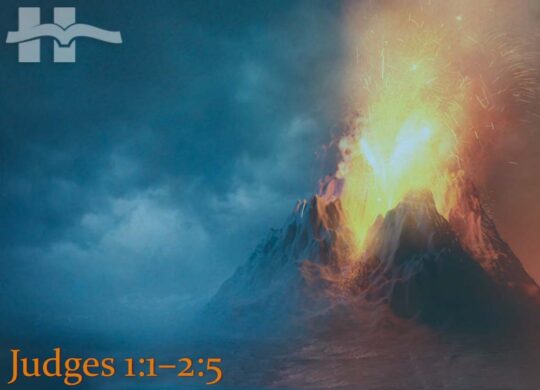Judges 1:1–2:5

Faithfulness to God manifest in uncompromising godliness and reliance on God brings blessing.
Joshua, the one who had begun to lead the Israelites so successfully against the Canaanites, and who was God’s agent for assigning land to the various tribes, was now gone. An era had concluded with the death of Joshua. A new beginning was at hand, and with it the challenge of finding godly leaders. Who would be the next godly servant to lead Israel? The Israelites do not ask Yahweh for a leader, only for a tribe to lead the battle. Commitment and confidence is thereby shown to be shaky from the start.
The living arrangements between the Israelites and Canaanites as this passage progresses are revealing. Initially, with the endeavors of the Judah-Simeon alliance (1:3–21), we are not told of Canaanites living among the Israelites; then from Benjamin to Zebulun (1:21–30), the Canaanites are found living with the Israelites; the situation worsens with Asher and Naphtali: here it is the Israelites who are living among the Canaanites (1:31–33); in the final phase, they are themselves displaced, unable to occupy the valley (1:34–36). Far from a conquest, this is an “anticonquest”! In sum, this pericope portrays a failed project to take over Canaan. So while there is a seeking of God at the beginning of this pericope (1:1–2), there is, unfortunately, only a weeping before him at the end (2:4–5).
A litany of incomplete “successes” and outright failures highlights our text (1:19, 21, 24–36). Our curiosity is aroused about the cause of all the continued failures in battle. We find the real answer only in 2:1–5—there was a spiritual reason for the Israelites’ lack of military success. These failures, we are told there, stemmed from an illicit covenanting with the inhabitants of Canaan, noted in 1:22–26. Despite the assured presence of Yahweh as the house of Joseph went against Bethel, the campaign was a failure—not only did a Hittite family go free (1:25), the destroyed city was also rebuilt as Luz (1:26): the people and their culture had rebounded. This was clear disobedience to divine will that no covenant be made with the local peoples: Israel was to destroy them utterly (Jdg 2:2; Deut 7:1–2, 16). All of these miscarriages in Judges 1 form the basis for Yahweh’s indictment of Israel in 2:1–5.
Yahweh’s rebuke is stinging: his people, forgetting their covenant God, had made covenants with the Canaanites, and not destroyed their cultic sites: they had disobeyed the explicit commands of Deut 7:1–5, 16, 25–26 (see Jdg 2:1–2). In fact, it was because of their disobedience that God was refusing to drive out the Canaanites before the Israelites, that otherwise would have been accomplished by God himself (2:3).
Therefore, Yahweh announced, he would not completely drive out the land’s inhabitants who would end up as thorns to the Israelites (and their gods as snares; 2:3). Of course, Yahweh would be faithful to keep his covenant and Israel would possess the land, as he had promised the “fathers” (2:1).
Compromise and disobedience are always disastrous. In sum, the degradation of the nation had begun immediately after the demise of Joshua. This pericope begins with the most positive of the tribes (Judah) and ends with the most negative (Dan). Almost the same sequence of tribes is followed in the sections on individual judges (Jdg 3:7–16:31), with this progressive dissolution expressly detailed.
Nonetheless, the contrition exhibited by the Israelites in Jdg 2:4–5 is hopeful but, as it turns out, this change of heart is only transitory: the Israelites’ apostasy only worsens as the next pericope will show and the rest of the book will depict.
[For more details, see my Judges commentary.]












 Abe Kuruvilla is the Carl E. Bates Professor of Christian Preaching at The Southern Baptist Theological Seminary (Louisville, KY), and a dermatologist in private practice. His passion is to explore, explain, and exemplify preaching.
Abe Kuruvilla is the Carl E. Bates Professor of Christian Preaching at The Southern Baptist Theological Seminary (Louisville, KY), and a dermatologist in private practice. His passion is to explore, explain, and exemplify preaching.